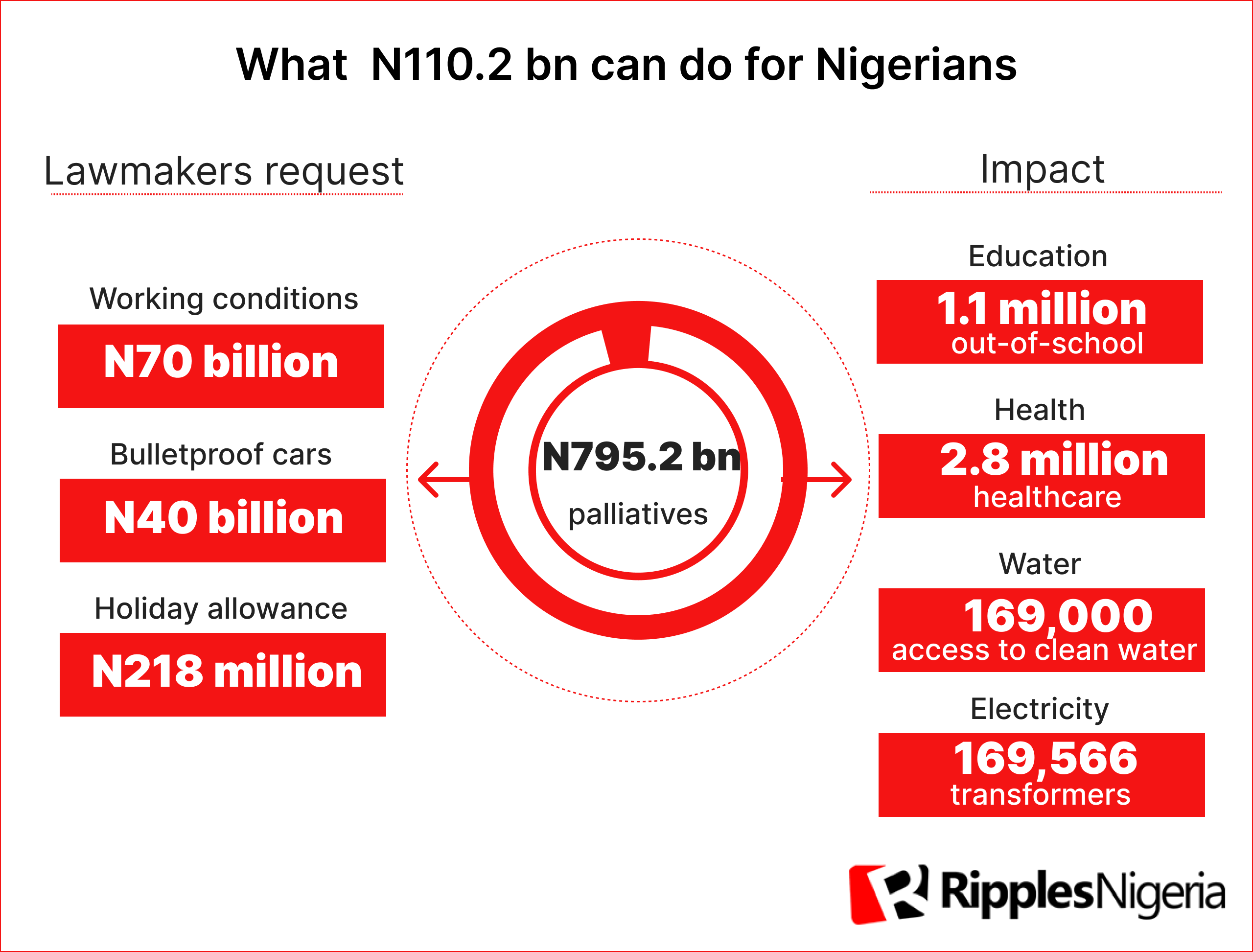Ripples Metrics
RipplesMetrics: What lawmakers’ N110.2bn palliatives can do for Nigerians

Context: RipplesMetrics calculated that a total of N110.2 billion has been announced for different palliatives in over 80 days of President Tinubu which has raised controversial concerns.
It came as a shock to all sectors of the economy and public when President Bola Tinubu announced, during his inaugural speech, the removal of fuel subsidy. Although the president had reiterated his intention to remove the subsidy while campaigning for office, no one expected the declaration to make the inaugural speech.
The declaration by the president hinged on the premises that the allocations had been marred by corruption and excessive mismanagement; an allocation which could improve any other sector of the economy.
In 2022, N4.39 trillion, according to the Nigerian National Petroleum Company Limited (NNPCL), was spent on subsidising fuel. Just in February, it disclosed that at least N400 billion was spent monthly.
Assumably, fuel subsidy is considered the highest palliative by the government despite the country being an oil-producing state. The lingering subsidy is not unconnected to the dormancy experienced in Nigeria’s oil refineries. Hence, the country exports oil for refining and imports it subsidizing the selling price. Meanwhile, the removal had since then RipplesMetric reported, inflated the price of goods and transportation.
In a separate development, there have reportedly been palliative requests by federal lawmakers totalling N110.2 billion which have stirred up controversies in the public since the announcement was made. On the opposing end, the requests are coming at a time the country is grasping to adjust to the effect of subsidy removal. This report takes an introspection into the palliatives requested and how profitable the funding can serve the country if redirected.
READ ALSO:RipplesMetrics: Tinubu’s ministerial nominations, the important numbers at a glance
Palliative scheme
Some weeks after the inauguration of the 10th National Assembly, the lawmakers approved 110 billion from the Supplementary budget for lawmakers. N70 billion was allocated to support the working conditions of lawmakers while N40 billion was for the acquisition of bulletproof cars and other luxury vehicles for principal officers and other members of the assembly. This also came under heavy criticism upon the announcement. But that was not all.
Also, just after the screening of the ministerial nominees, the Senate President, Godswill Akpabio, said that a holiday allowance, reportedly N2 Million, had been paid to the senators to enjoy their recess. This amounts to N218 million shared among 109 senators.
RipplesMetrics calculated that a total of N110.2 billion has been announced for different palliatives in less than 60 days of the National Assembly which has raised concerns. However, Nigeria still battles challenges around health, education, power, water and housing and the allocation, if well invested, could contribute to improving the lives of millions of Nigerians.
What can this money do?
The latest data by UNESCO says that Nigeria now has 20 million out-of-school children. Using the recent school fee increase in Unity schools to N100,000 by the Federal Ministry of Education, the money, if redirected, can place 1.1 million out-of-school children in several Unity schools across the country.
Also, the International Trade Administration said that less than five per cent of the Nigerian population is enrolled in the Nigeria Health Insurance Scheme. That is an estimate of 120 million Nigerians lacking health insurance coverage. A report said that it would cost up to N40,000 to get a health consultation. Assuming the allocation is redirected to health, 2.8 million Nigerians would be able to seek healthcare from specialists.
Meanwhile, the United Nations said that 133 million Nigerians do not have access to potable water. A report said the cost of drilling a borehole cost as high as N650,000. If the money was redirected to providing water, more than 169,000 Nigerians could have access to clean water in their respective communities.
Similarly, with 92 million Nigerians lacking access to electricity, the allocation can provide over 169,566 Meksan Power Transformers 50KVA in several communities.
Since the announcement, there have been several efforts by civic organizations, labour unions and other non-governmental agencies to call out the frivolous spending by the government and lawmakers as this puts a weight on the increasing cost of governance.
By James Odunayo
Join the conversation
Support Ripples Nigeria, hold up solutions journalism
Balanced, fearless journalism driven by data comes at huge financial costs.
As a media platform, we hold leadership accountable and will not trade the right to press freedom and free speech for a piece of cake.
If you like what we do, and are ready to uphold solutions journalism, kindly donate to the Ripples Nigeria cause.
Your support would help to ensure that citizens and institutions continue to have free access to credible and reliable information for societal development.
























